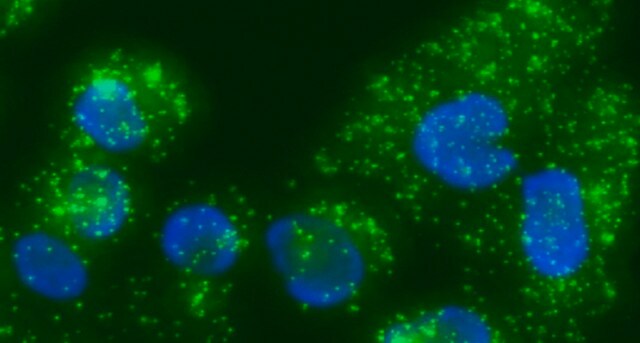P1620
Anti-PRMT1 antibody, Mouse monoclonal
clone PRMT1-171, purified from hybridoma cell culture
Sinónimos:
Anti-Protein-Arginine Methyl Transferase 1
About This Item
Productos recomendados
biological source
mouse
Quality Level
conjugate
unconjugated
antibody form
purified immunoglobulin
antibody product type
primary antibodies
clone
PRMT1-171, monoclonal
form
buffered aqueous solution
mol wt
antigen ~42 kDa
species reactivity
mouse, chicken, bovine, human, canine, hamster, monkey, rat
concentration
~2 mg/mL
technique(s)
immunoprecipitation (IP): suitable
indirect ELISA: suitable
western blot: 2 μg/mL using whole cell extract of 293T cells
isotype
IgG1
UniProt accession no.
shipped in
dry ice
storage temp.
−20°C
target post-translational modification
unmodified
Gene Information
human ... PRMT1(3276)
General description
Specificity
Immunogen
Application
Biochem/physiol Actions
Physical form
Storage and Stability
Disclaimer
¿No encuentra el producto adecuado?
Pruebe nuestro Herramienta de selección de productos.
Related product
Storage Class
12 - Non Combustible Liquids
wgk_germany
WGK 2
flash_point_f
Not applicable
flash_point_c
Not applicable
Certificados de análisis (COA)
Busque Certificados de análisis (COA) introduciendo el número de lote del producto. Los números de lote se encuentran en la etiqueta del producto después de las palabras «Lot» o «Batch»
¿Ya tiene este producto?
Encuentre la documentación para los productos que ha comprado recientemente en la Biblioteca de documentos.
Nuestro equipo de científicos tiene experiencia en todas las áreas de investigación: Ciencias de la vida, Ciencia de los materiales, Síntesis química, Cromatografía, Analítica y muchas otras.
Póngase en contacto con el Servicio técnico






